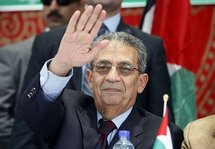Arab chief on landmark visit calls for 'breaking' Gaza siege
Sakher Abu El Oun
GAZA CITY, Sakher Abu El Oun- Arab League chief Amr Mussa on Sunday called for Israel's four-year siege of the Gaza Strip to be "broken" as he made a landmark visit to the impoverished Palestinian enclave.
The visit, Mussa's first to Gaza as League secretary general, came as appeals mounted for an end to the blockade after Israeli commandos killed nine Turkish activists during a raid on an aid flotilla bound for Gaza on May 31.

Arab League chief Amr Mussa waves to Palestinians during his visit to the Jabalia refugee camp.
"Not only the Arabs, but the entire world should stand with the Palestinian people against the siege of Gaza and what is happening in the occupied territories, especially east Jerusalem," he said of Jewish settlement growth in the annexed Arab half of the city.
It was the first time that Mussa visited the besieged coastal strip since becoming head of the 22-member pan-Arab organisation in 2001, although he visited Gaza in the 1990s when he was Egyptian foreign minister.
Gaza's Hamas rulers hailed the visit by Mussa, the most senior Arab leader to set foot in the Palestinian enclave since the Islamists' landslide win in parliamentary elections in 2006.
"This is an official Arab step on the way to breaking the siege," Hamas prime minister Ismail Haniya told reporters at his home in Gaza City's Shati refugee camp after meeting Mussa there.
"We hope that there will be concrete results from this visit," he added.
The 10-hour visit, announced shortly after the flotilla raid, was also aimed at reviving reconciliation efforts between Hamas and Palestinian president Mahmud Abbas' secular Fatah movement, which was driven from Gaza in June 2007.
"Reconciliation is the basic and principal question. It is a question of will and not a mere signature -- it's a will, it's a policy, it's a position that translates into an agreement on all issues," Mussa told reporters.
"History does not halt before a sentence here or a paragraph there."
Egyptian efforts to broker a unity deal between the two main Palestinian movements collapsed in October 2009 when Hamas refused to sign an agreement backed by Cairo and Fatah.
On Sunday, Mussa toured some of the areas most devastated by Israel's December 2008 assault on Gaza, in which some 1,400 Palestinians were killed and thousands of homes were seriously damaged or destroyed.
Thirteen Israelis were killed during the 22-day war, which was launched to stem years of near-daily rocket attacks from the territory.
Mussa also visited the headquarters of the UN agency for Palestinian refugees and met the leaders of various Palestinian factions, including Fatah, before returning to Egypt.
Gaza's 1.5 million inhabitants have been under a crippling Israeli-Egyptian blockade imposed on the territory in June 2006 after militants captured Israeli soldier Gilad Shalit, now 23 years old, in a deadly cross-border raid.
The blockade was tightened a year later after Hamas seized control of the enclave, with Israel and Egypt sealing the territory off from all but basic humanitarian aid and strictly limiting travel in and out.
Two weeks ago, a six-ship flotilla carrying 10,000 tonnes of supplies tried to break the blockade and reach Gaza, but was stormed by Israeli naval forces in a raid that sparked global outrage.
The widespread fury over the blockade had a galvanising effect on Cairo, which quickly moved to reopen the Rafah crossing days later, allowing travellers and humanitarian aid to pass, but not commercial goods.
Israel has said the closure is necessary to prevent Hamas from importing weapons, and insists the humanitarian needs of Gaza's people are met by the dozens of truckloads of basic goods it allows in most days.
---------------------------------------------------------------------------------